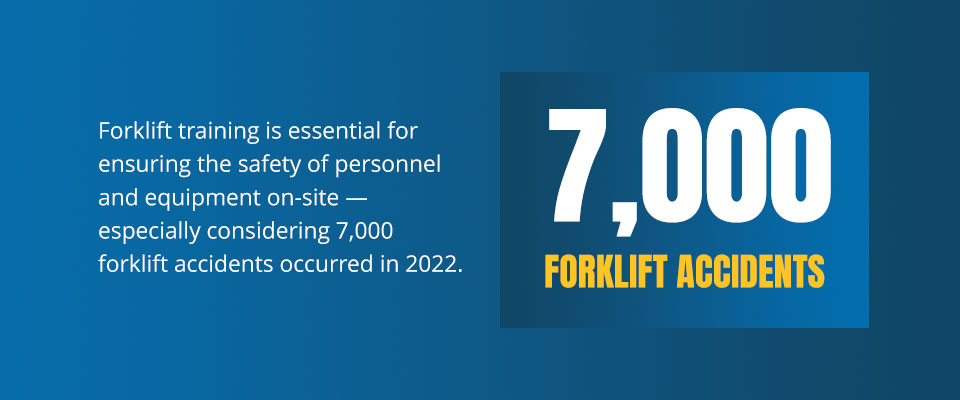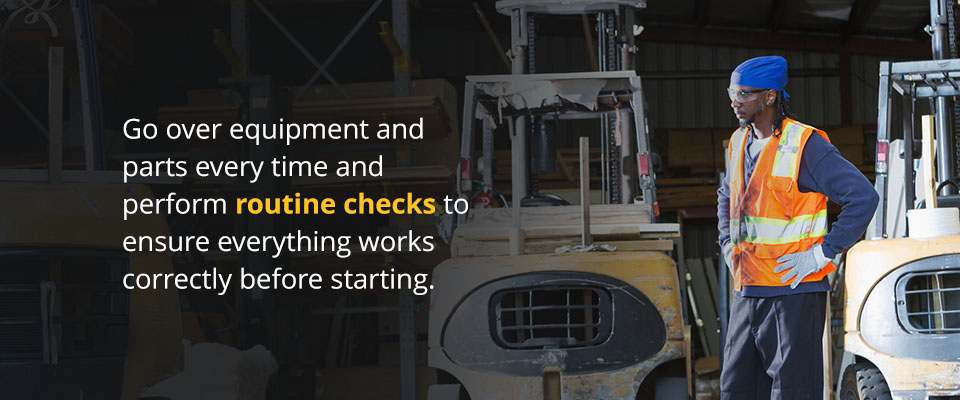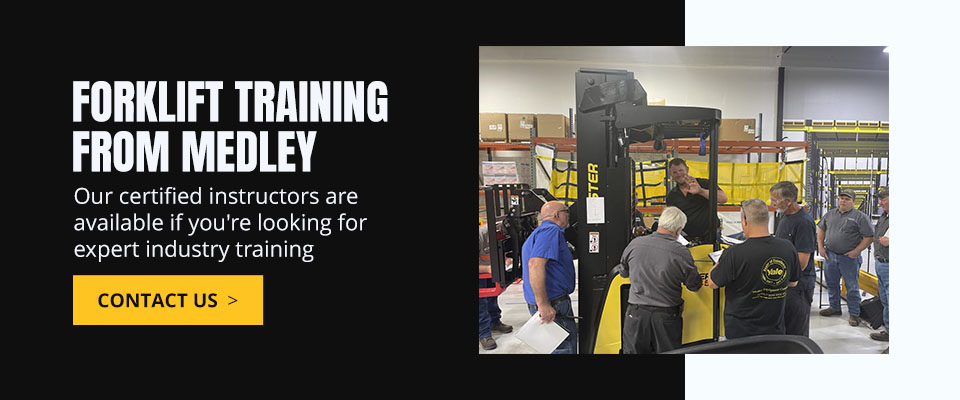Workplaces with heavy machinery need expert safety training and comprehensive safety standards to protect all personnel and equipment during operations. If your employees lack the proper training, you can face increased accident rates and rising costs. Investing in forklift safety training helps protect employees and reduces unnecessary expenses and delays. With the proper training, you’ll see increases in productivity and efficiency as your accident and damage rates decrease.
What Is Forklift Safety Training?
The Occupational Safety and Health Administration (OSHA) requires all powered industrial truck operators to receive training and certification. Any employees in charge of operating forklifts must have proper training to use forklifts. After passing training, participants receive their operating license, which is valid for three years. Getting the right safety training is essential for anyone looking to operate a forklift for their job.
Why Is Forklift Training Important?

Forklift training is essential for ensuring the safety of personnel and equipment on-site — especially considering 7,000 forklift accidents occurred in 2022. If the product being moved by the forklift is dropped, torn or punctured, it can lead to injury, product damage, chemical spills and even death.
Without proper training and certification, your facility could see more injuries and product loss in addition to OSHA violations. Investing in high-quality training will make your facilities and employees safer.
Benefits of Forklift Training
Forklift operator training is essential for any company looking to improve operations. Investing in safety training maximizes your operation’s cost-effectiveness, productivity and safety. You’ll develop a safer, better workplace that cuts downtime and protects valuable employees and products. The better your forklift training, the more skilled your workforce and the better your business will be.
Here are some of the benefits you can expect from investing in forklift operator training:
- Reduce downtime: Downtime cuts productivity, increases expenditures and leads to faster equipment wear. If your forklift operators are properly trained, you’ll have fewer downtime incidents. The more downtime you reduce, the more money, fuel and time you’ll save.
- Fewer injuries: Proper training helps protect employees from harm. With more training, operators have more experience using forklifts, making them less likely to injure themselves and others while on the job. They’ll learn about the dangers of the job and the best ways to protect themselves and others every day.
- Decrease product damage: Untrained forklift operators lack the skills to move product reliably. Improper forklift usage can lead to product damage or puncturing. Higher product damage rates mean increased expenses and decreased efficiency and customer satisfaction.
- Improve accuracy: With training comes confidence — trained operators will have the skills to precisely move the forklift and transport product. The more accurate your team is, the higher your productivity and cost savings.
- Increase efficiency: The more precise your team and the safer their operation, the more efficient your operation becomes. Training gives operators the skills and confidence necessary to move quickly and effectively, reducing damage and maximizing efficiency.
- Optimize productivity: Increased productivity comes with greater accuracy and efficiency. Skilled, trained operators will do more in less time with reduced downtime and accidents.
- Maximize profit: You’ll maximize profits with trained operators working productively, safely and efficiently. Reduced downtime and increased productivity mean fewer unnecessary expenses and greater profit margins.
10 Simple Tips for Forklift Safety
Employees completing forklift training will receive comprehensive instruction in forklift safety and operation. When operating machinery like forklifts, safety should always be the priority. While operators taking forklift safety training will learn everything they need to know about correct, safe operation, you can keep these 10 tips in mind to help you remain safe while operating a forklift:

- Only use qualified operators: Only let trained and certified operators use the forklift. This policy protects your business, product and employees from harm and liability.
- Examine equipment before use: Get in the habit of checking equipment before operating it. Go over equipment and parts every time and perform routine checks to ensure everything works correctly before starting. You’ll reduce damage and injuries when performing proper safety checks.
- Inspect the surrounding environment: Always remember site guidelines while using the forklift. Following site guidelines will help keep you safe and ensure you work efficiently.
- Operate at Safe Speeds: Ensure you always adhere to the equipment speed limit. Take turns slowly to prevent accidents and protect the product while in transport. The safer your speed, the less likely you are to have an accident.
- Avoid hazards: Make sure your surroundings are always clear of hazards and people. Staying alert reduces the chances of accidents and prevents you from harming the product or equipment. Watch out for bumps, uneven surfaces and loose objects while operating equipment.
- Check load before starting: Ensure your load is safe and secure before driving to your destination. Check to see that nothing is overloaded or uneven — overloaded or unbalanced items are likely to fall, puncture or cause injury.
- Avoid the mast: Ensure all operators and personnel know to avoid walking near or under the forklift. Standing or walking under the load can lead to injury or death. Having everyone stay observant around forklifts will protect employees and products from harm.
- Fuel properly: When fueling the equipment, always do it at the designated station. Make sure the forklift is turned off before fueling, and always fuel in a well-ventilated space.
- Park correctly: After finishing for the day, make sure to park in the designated forklift space. Fully lower the forks, apply the parking brake and shut everything down. Correct parking helps keep the forklift in a clear place and reduces the chances of damage or accidents.
- Wear appropriate clothing: Always use the proper workwear provided by your company. Personal protective equipment (PPE) helps keep you safe on the job in the event of an accident.

Forklift Safety Training From Medley
Since 1942, Medley Equipment Company has delivered our customers specialized material handling solutions and services. Our certified instructors are available if you’re looking for expert industry training. We come directly to you, ensuring training is as effective and convenient as possible. Enrollees will receive training, take a written test and perform a practical demonstration before receiving their certification.
As a leader in our industry, Medley provides unmatched equipment purchases and rentals, warehouse solutions and services to our customers. If you’re interested in specialized training, contact us online today! We’ve got locations in Arkansas, Missouri, New Mexico, Oklahoma and Texas — visit one of our locations to learn more.
